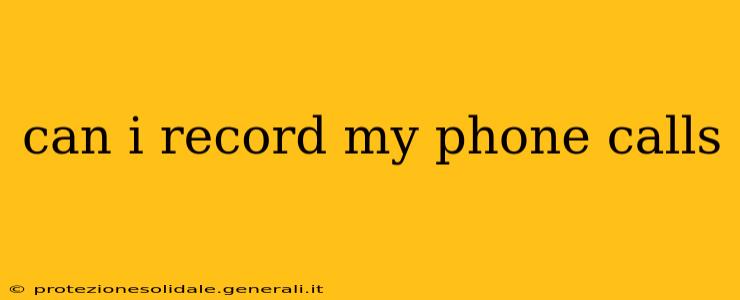Can I Record My Phone Calls? A Comprehensive Guide to Legality and Best Practices
The question of whether you can record phone calls is complex and depends heavily on your location and the specific circumstances. There's no single, simple answer. This guide will explore the legal aspects, ethical considerations, and practical tips for recording phone conversations.
It's crucial to understand that laws regarding phone call recording vary significantly by state and country. What's legal in one place might be illegal in another. This information is for general guidance only and should not be considered legal advice. Always consult with a legal professional if you have specific questions or concerns.
What are the Laws Regarding Recording Phone Calls?
One-party consent states: In many US states, "one-party consent" is the law. This means that as long as one party to the conversation (you) knows the conversation is being recorded, the recording is generally legal. This doesn't necessarily mean you need to explicitly tell the other party, but it does mean you need to be aware of and consenting to the recording yourself.
Two-party consent states: In other states, "two-party consent" is required. This means both parties must agree to the recording. If you record a conversation in a two-party consent state without the other person's knowledge and consent, it's illegal.
California, Connecticut, Florida, Illinois, Maryland, Massachusetts, Montana, Nevada, New Hampshire, Pennsylvania, and Washington are examples of two-party consent states.
International Laws: Laws vary widely internationally. Some countries have stricter regulations than others. Always research the specific laws of the country where the call originates and the country where the recipient is located.
What if I'm Recording for Business Purposes?
The legal landscape changes when recording calls for business purposes. While one-party consent might generally apply, businesses often have additional considerations, including compliance with industry regulations and data privacy laws like GDPR (in Europe). Transparent policies and clear notification to callers are crucial in these contexts.
What About Recording Calls with Public Officials?
Recording phone calls with public officials may have different legal implications. Some jurisdictions allow recording of public officials acting in their official capacity, while others may have restrictions. This area is particularly nuanced and requires specific legal advice.
Are There Ethical Considerations?
Even when legally permissible, recording a phone call without informing the other party raises significant ethical concerns. Transparency and respect for the other person's privacy are essential. Consider whether recording the call is truly necessary and if there are alternative ways to achieve your goal.
How Can I Record Phone Calls Legally and Safely?
If you determine recording a call is both legal and ethically sound in your situation, here are some tips:
- Know your state's laws: This is paramount. Failing to comply with your state's recording laws can lead to serious legal consequences.
- Use reputable recording apps: Several apps are available for recording phone calls, but it's important to choose a reliable and secure one that complies with relevant laws.
- Clearly indicate recording: While not always legally required, it's best practice to inform the other party that the conversation is being recorded. This promotes transparency and builds trust.
- Securely store recordings: Properly store your recordings to prevent unauthorized access and comply with data privacy regulations.
Disclaimer: This information is for educational purposes only and should not be considered legal advice. The laws regarding phone call recording are complex and vary significantly. Consult with a legal professional to ensure you comply with all applicable laws in your jurisdiction before recording any phone calls.
